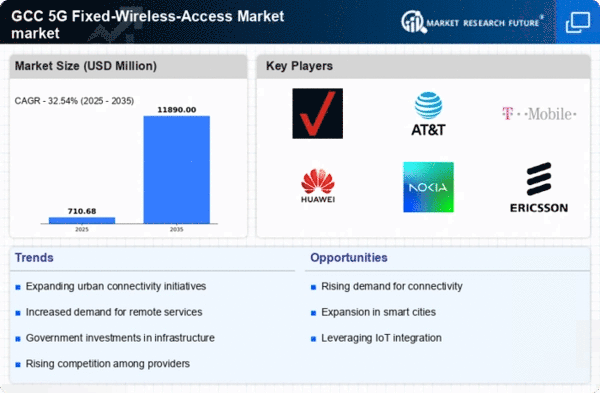Rising Adoption of Smart Technologies
The proliferation of smart devices and IoT applications in the GCC is significantly influencing the 5g fixed-wireless-access market. As households and businesses increasingly adopt smart technologies, the demand for high-speed internet connectivity rises correspondingly. The market is projected to grow as more devices connect to the internet, requiring faster and more reliable connections. For instance, the number of connected devices in the GCC is expected to reach over 1 billion by 2025, creating a substantial demand for 5g fixed-wireless-access solutions. This trend indicates a shift towards a more interconnected lifestyle, where seamless connectivity is essential for the functioning of smart homes, smart cities, and industrial automation. Consequently, telecommunications companies are likely to prioritize investments in 5g fixed-wireless-access infrastructure to cater to this growing market.
Competitive Landscape and Market Dynamics
The competitive landscape within the GCC's telecommunications sector is evolving, with multiple players vying for market share in the 5g fixed-wireless-access market. This competition is fostering innovation and driving down prices, making high-speed internet more accessible to consumers and businesses. As of 2025, several key players have emerged, each offering unique solutions and pricing models to attract customers. The market dynamics suggest that companies are likely to invest heavily in marketing and infrastructure to differentiate their offerings. This competitive environment may lead to enhanced service quality and customer satisfaction, ultimately benefiting the overall market. Furthermore, the entry of new players into the market could stimulate further growth, as they introduce innovative technologies and services tailored to the needs of the GCC region.
Increased Urbanization and Connectivity Needs
The rapid urbanization in the GCC region is driving the demand for enhanced connectivity solutions. As urban populations grow, the need for reliable and high-speed internet access becomes paramount. The 5g fixed-wireless-access market is positioned to meet these demands, providing seamless connectivity in densely populated areas. According to recent estimates, urban areas in the GCC are expected to see a population increase of over 20% by 2030, necessitating robust infrastructure. This urban growth is likely to push telecommunications providers to invest in 5g fixed-wireless-access technologies, ensuring that urban residents have access to high-speed internet services. The increasing reliance on digital services in urban settings further emphasizes the importance of this market, as businesses and consumers alike seek reliable connectivity solutions.
Evolving Consumer Expectations and Digital Services
Consumer expectations in the GCC are evolving rapidly, with a growing demand for high-quality digital services. The 5g fixed-wireless-access market is responding to these changing expectations by offering faster and more reliable internet connections. As consumers increasingly rely on streaming services, online gaming, and remote work solutions, the need for robust connectivity becomes critical. Market data indicates that the demand for high-speed internet services is projected to grow by over 30% in the next few years. This shift in consumer behavior is prompting telecommunications providers to enhance their service offerings, ensuring that they meet the rising expectations of their customers. The focus on delivering superior digital experiences is likely to drive further investments in the 5g fixed-wireless-access market, as companies strive to remain competitive in a rapidly changing landscape.
Government Investments in Telecommunications Infrastructure
Government initiatives in the GCC are playing a crucial role in the development of the 5g fixed-wireless-access market. Substantial investments in telecommunications infrastructure are being made to support the rollout of 5g technologies. For instance, the GCC governments have allocated billions of $ towards enhancing digital infrastructure, which is expected to bolster the 5g fixed-wireless-access market. These investments are aimed at improving connectivity in both urban and rural areas, ensuring that all citizens have access to high-speed internet services. The strategic focus on digital transformation and smart city initiatives further underscores the importance of these investments. As governments continue to prioritize telecommunications development, the 5g fixed-wireless-access market is likely to experience accelerated growth, driven by enhanced infrastructure and increased accessibility.















